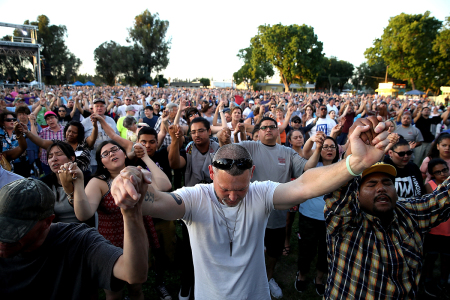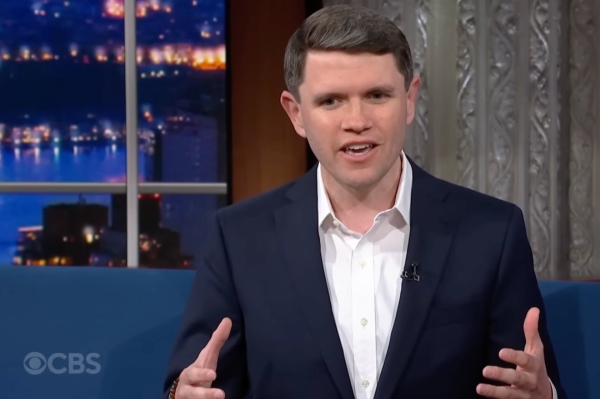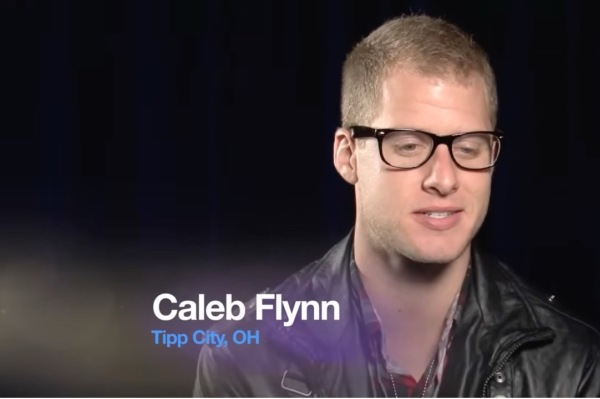Persecution watchdog warns of growing hostility to Christians in US: 'Frogs in the kettle'

The president of a nonprofit Christian persecution watchdog that monitors hostility to faith and freedom abroad warned that too few Christians in America and the West seem aware of how such trends are manifesting at home.
"Basically, we are frogs in the kettle, and the bubbles keep coming up under us," Jeff King, president of the Washington, D.C.-based International Christian Concern (ICC), told The Christian Post.

"Too many people are not aware politically, and they're so used to thinking of how things were that they can't figure out where these bubbles are coming from, not realizing they're being cooked."
ICC, which was founded in 1995 to advocate for the persecuted church around the world, has been speaking out, particularly about Staci Barber's case in Texas.
Barber is a school teacher who sued the Katy Independent School District near Houston in March after her principal allegedly reprimanded her last September for praying with two other teachers at the school's flagpole as part of "See You At the Pole," an annual international event.
The administrator reportedly told her that teachers were not allowed to pray where students could see them and be influenced to join, according to the American Center for Law & Justice (ACLJ). Teachers were told they "could not pray in any location where students would be present, even if this praying occurred before the school day began," according to the lawsuit.
Barber had previously been barred from starting a campus chapter of Students for Christ, and the school board instituted a policy mandating that "employees will neither advance nor inhibit religion."
"Employees may not promote, lead, or participate in religious activities of noncurriculum-related student groups," the policy stated, which the ACLJ argued is "blatantly unconstitutional," according to the Christian Broadcasting Network.
King told CP that Barber's case "highlights the depth of ignorance among school boards and even at the principal level of what rights the Constitution grants people," but he suggested her situation is symptomatic of a wider hostility toward Christians in the U.S. at all levels.
King warned that the same trends his nonprofit has been tracking and advocating against overseas are increasingly manifesting in the historically free nations of the Western world, including the United States. He pinpointed a corrupt, cumbersome judicial process and proliferating hate speech laws as the main prongs of the attack on Christian beliefs.
King explained that dictators and despots will promise religious liberty out of one side of their mouths while at the same time effectively mandating that religious citizens keep their opinions to themselves and out of the public square.
"If that sounds familiar, there's a reason," he said. "The big picture, and what people need to grasp, is that's what's going on here in the West, and that's what a lot of people who dislike Christianity are proposing and trying to push forward."
In countries where leaders possess antipathy toward Christianity, a politically weaponized judicial system plays a key role in chilling speech and driving Christians to self-censor, King said. He cited the example of India, where Christians are increasingly persecuted and their churches vandalized despite the guarantee of religious freedom in the country's constitution.
"They have religious freedom in their constitution, but it doesn't matter," he said of India. "It's what happens in practice. And so when pastors are often attacked in the streets or in the churches, guess who gets arrested? It's the pastor. What happens is you keep your head down. So this is what we're seeing in the States."
Even if courts rule against the bad actors, King noted that the onerous judicial process itself is sufficient to convey the regime's message.
"People learn that you do not stick your head up, and you start being quiet because the process is the punishment," he said, adding that he has even seen examples of similar situations in Christian ministries in the U.S. where employees have been dragged before HR for not "toeing on the line" on LGBTQ issues and pronoun usage.
He pinpointed that the most egregious hate speech laws are in Canada and Europe, but noted that the same impulse to clamp down on speech — especially regarding sexuality — is also emerging in the U.S. with proposed legislation such as the Equality Act.
"It's strategic, it's banana republic, and these are political enemies of Christianity," he said. "They've gained power, and they're using the very laws, the very power of democracy, to go against their political enemies."
King also observed that American culture has shifted dramatically within the past 30 years or so, and that the population has been "softened up" to the creeping totalitarian and anti-Christian impulses of their political leaders.
Noting how such things have progressed gradually along a spectrum, he was reluctant to trace such trends to any particular year or event, but said they seemed to escalate as a backlash to the political rise of the Moral Majority during the 1980s.
Likening their influence to "poison that's been poured into the masses for the last 30 years," King said media and the entertainment industry have played a pivotal role for decades in promoting immorality and portraying people of faith in a negative light.
"When you use propaganda, you can turn the masses over time, and that's part of what's happened," he said, adding that a hedonistic society views Christians as an unwelcome "giant stop sign" against such impulses, which leads to building resentment.
Regarding whether there is any hope that things can be turned around, King acknowledged that while some recent U.S. Supreme Court decisions have been favorable, the behavior of many school boards and employers is "discouraging."
He also said that with the rise of cancel culture, the public discourse has also shifted from encouraging vigorous debate to considering it acceptable to silence and "punish those who have different views."
King maintained that Christians must first seek revival in their own spheres of influence.
"This really comes down to revival, and it starts with us personally," he said. "We've all got to turn back and cry to the Lord about not the political state of our country, but the religious state," he said.
"We desperately need revival, and that all starts with us personally looking to the Lord and saying, 'Call me back and I'm completely yours, whatever you would have me do. All of my life is yours.'"
Jon Brown is a reporter for The Christian Post. Send news tips to jon.brown@christianpost.com





















